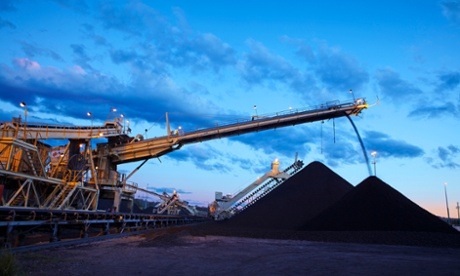
Famed Nasa climate scientist James Hansen has joined 21 other academics to urge the New South Wales government to ban new coal mines in the Hunter Valley, saying mining is putting residents’ health at risk.
In a pre-election salvo, a letter to NSW premier Mike Baird raises concerns about health impacts from air pollution, degradation of underground water and soil and the resulting “dangerous changes” to Australia’s climate due to the release of greenhouse gases.
The letter states: “The health of the community and the social and environmental values of the Hunter Valley are being damaged by the increasing coal production in the region.
“People’s health is at risk from declining air quality associated with coal mining, transportation and combustion. The illnesses and deaths associated with air pollution from coal in the region are potentially costing taxpayers millions of dollars each year.
“It is time to begin to phase out coal production in the Hunter Valley and begin a transition to a safer, healthier, and secure economic future.”
The letter is signed by Hansen, who is considered one of the first scientists to highlight the issue of climate change through his testimony to US Congress in the 1980s, along with former Australians of the year Fiona Stanley and Tim Flannery.
An accompanying report by the Climate and Health Alliance, a coalition of 28 health groups that are concerned about climate change, calculates that the health damage caused by the Hunter Valley’s five coal-fired power stations costs the economy $600m a year.
This figure, estimated by Economists at Large, is based on the health costs and lost productivity from respiratory problems, such as asthma, and cardiac issues caused by coal dust particles released into the atmosphere.
Air quality monitors in the Hunter Valley picked up 118 breaches of the safe national standard for PM10, a type of fine particle that can cause ill health when absorbed, in 2013. Such air pollution has been clearly linked to adverse health overseas but, the report admits, no comprehensive study of the impact of coal mining on health in the Hunter Valley has been conducted.
The Climate and Health Alliance said the NSW government and the opposition Labor party should commit to halting any new coal projects in the Hunter Valley. NSW goes to the polls on 28 March.
The Hunter Valley is now home to two thirds of NSW’s coal production, with 31 coal mines and five coal-fired power stations pumping out an estimated 145m tonnes of carbon dioxide a year.
There are 21 new mines or mine extensions proposed for the Hunter, meaning emissions would rise to 243m tonnes if they went ahead.
“The decision to continue the expansion of coal is flawed for many reasons, one being the strong association between living near coal mines and a variety of health impacts,” said Liz Hanna, an ANU academic and president of the Climate and Health Alliance.
“The huge subsidies given to the mining industry are immoral and the economic benefit for a small few, which are sacrificing the health and livelihoods of people, is not even justified given that coal is an outmoded energy source.
“The Hunter Valley was once beautiful and pristine, it was green and lush with clean air. It’s a shameful disgrace to sacrifice this beautiful area for a toxic industry.”
Hanna said there would be “cascading health impacts” if coal mining was allowed to expand in the Hunter, predicting that politicians who backed this growth “will not be rewarded at the ballot box”.
Wendy Bauman, a farmer who lives in the small town of Camberwell, 90km from Newcastle, said the community was concerned about the health ramifications of mining.
“I am surrounded by mines here, the nearest open cut mine is just 1km from me,” she said. “The biggest issue is the air pollution which is absolutely horrendous, it gets inside your house and we breath it in. I’ve had a CT scan and I’ve lost 20% of my lung function and I’ve got dust in my lungs.
“The other problem is the water. We live on the driest inhabited continent on Earth, so water is critical. The Hunter river is so polluted now.”
Bauman said she had to give up dairy farming due to the negative impact of coal dust upon her business.
Earlier this month, Rio Tinto’s Bengella Mine extension project was approved. The mine is 4km from the Hunter Valley town of Muswellbrook and will be able to mine an additional 15m tonnes of coal a year for 24 years. It is estimated this expansion will provide about 900 jobs and $778m in state royalties.
Last week, both the NSW Coalition government and Labor opposition voiced support for the mining industry. The parties said they supported a reduction in the time it took to assess mining projects, in order to deliver jobs and investment more rapidly.
